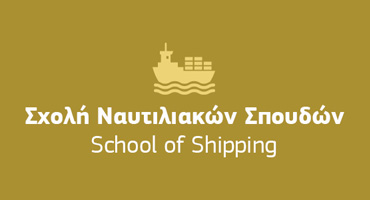





BA (Hons) Business Management (Shipping)
-
No1 in Greece | TOP10 in the UK.
-
CMI accreditation (Chartered Management Institute).
-
Internal Auditor ISM-ISPS-MLC accreditation for shipping companies.
-
Second foreign language taught: Chinese, Russian, Spanish.

Course Information
The BA (Hons) Business Shipping is a unique programme designed by the School of Shipping of Mediterranean College in collaboration with the University of Derby, a TOP10 UK University for Management studies (Guardian University Guide, 2020). The programme enables you to gain valuable insight in business administration principles and shipping industry practices. The course qualifies you as a professional, able to work in the shipping or in any other industry.
The is the only undergraduate business shipping programme accredited by the UK Chartered Management Institute (CMI). This accreditation ensures that you’ll develop the knowledge and skills that employers seek. It is one of the few where you’ll graduate with a highly regarded Bachelor degree as well as the CMI Level 5 Diploma in Management and Leadership.
While you study, you’ll have the opportunity to acquire the highly sought-after certification Internal Auditor ISM-ISPS-MLC for Shipping Companies, in partnership with the Norwegian-German Classification Register DNV GL, as well as attend language classes in Chinese, Russian or Spanish.
What you will study
Shipping is a constantly evolving industry and one of the most vibrant in the Greek economy. The BA (Hons) Business Management (Shipping) programme is unique in Greece, as you will apply the management theories and practices into the shipping business sector. The majority (2/3) of the course familiarises you with fundamental principles of business and management, vital for any type of industry, while the remaining (1/3) focuses on shipping management.
You will comprehend the key principles of shipping so as to adjust and keep up with the constant changes in this highly dynamic industry. You study sea transportation, port management, logistics, ship management, maritime law and chartering. The highlight of the programme is the Business Consultancy Project, which provides you the opportunity to apply in practice what you have learnt throughout the course in a real case shipping industry scenario.
Why choose this course
- The degree is awarded by the No1 Ranked UK University in Greece and TOP10 in the UK.
- It is the only CMI accredited programme, offering the CMI Level 5 Diploma in Management & Leadership.
- With a Business Shipping degree, you are flexible to work in the shipping or in any other industry.
- The only programme that provides the Internal Auditor ISM-ISPS-MLC for Shipping Companies accreditation, in cooperation with DNV-GL.
- You can change pathway in the 2nd year of your studies: Management, Finance or Marketing.
- You can participate in a student exchange week at the University of Derby.
- You get familiar with all business functions, through our business simulation lab and the SimVenture awarded software
- You undertake a live consultancy project in one of our partner shipping companies.
- You become a bilingual business executive, with exceptional academic and career prospects.
You’ll learn through lectures – some by guest lecturers, seminars, one-to-one or small group tutorials and self-directed study. You’ll take the theories off the page and put them into practice in real-world scenarios. You can test your ideas through business simulations, topical case studies and employer-led projects. A live consultancy project, where you help an employer to improve business performance, will build your research, project management, problem-solving and decision-making skills.
Assessment is mainly via coursework which can take forms such as, essays and report, group project work, research and consultancy projects, presentations, posters, design of digital materials, in-class tests, computer-based assessments.
Courses
Year 1
Understanding People in Organisations
This module introduces Organisational Behaviour (OB) theory and research to help students gain an understanding of the range of individual, group and organisational factors which can influence the way that employees behave in the workplace. Students will practice applying the theory to case study organisations to explore how it can be used as an analytical tool to gain a clearer understanding of the complex causes of workplace behaviour to develop effective management interventions.
Business Economics
Economics is all around us, present in almost every aspect of our lives. Knowledge of economics will therefore provide you with an essential insight into how markets work and how firms and consumers make decisions in market economies. Knowledge of economics is important to businesses as it helps them identify opportunities and potential threats, they may face in the environment they operate. Therefore, this module aims to develop your understanding of the core principles of micro and macro-economics. You will use economic models, theories and ideas to investigate current economic issues. The module will help you develop your understanding of economic information and will enable you to develop your ability and confidence to create your own independent thoughts around current economic issues.
Developing the Enterprising Mindset
Being able to apply an enterprising mindset is highly desirable in today’s fast moving business environment were reacting to gaps in the market or competitor actions, dealing with uncertainty, being able to make decisions and take action will all extend your commercial awareness and business acumen. Therefore, this module is all about developing your enterprising mindset and then applying it in a real-life situation. Building on and integrating the other first year business function modules, this module will overlay elements such as funnelling your creative energy, recognising the difference between a business idea and a business opportunity, deciding which approach is most beneficial, and then designing and implementing an appropriate plan of action.
The aim of the module to help you understand the relevance and interaction of these elements within a business context, and to give you transferable skills you can apply in any organisational situation. Moreover, strong emphasis will be placed upon you to demonstrate these skills and to reflect upon your progress.
Financial and Business Performance
This module will assume no prior accounting knowledge. You will learn how to prepare accounts for small businesses and then apply that knowledge to larger organisations. Numbers by themselves can be misleading and you will progress to examining accounting statements to assess just how well a business is performing. Managers cannot improve the performance of a business unless they make correct interpretations of situations and learn how to diagnose problems.
Business costs will be identified and analysed to aid decision making relating to the control and viability of projects. Sources of finance will be identified and discussed.
This basic financial knowledge is essential to anyone wishing to pursue a career in business, whether on a self-employed basis or in a larger corporation.
Marketing Fundamentals
This introduction to the “fundamentals of marketing” module will provide you with a basic understanding of the current and emerging marketing principles and techniques within the business environment. It seeks to establish that sustainable market success within a highly competitive environment can only be achieved by developing products or services based upon an understanding of the external environment and customers’ needs and wants. During the module you will not only consider how to add value for customers and other stakeholders but also learn to assess the impact that marketing activities have on consumers’ lives.
Your assessment is coursework-based, designed to enable you to demonstrate your ability to approach a business challenge as a marketer and business manager. The assessment methods used on this module will also help you develop key skills desired by employers, for example digital and visual communication and presentation skills, and business report writing. This module also contributes to achieving your Chartered Management Institute (CMI) level 5 Diploma under the dual accreditation arrangement. Enhanced employability is just one widely recognised outcome of membership of the CMI.
Operations, Supply Chain & IT
The module provides a framework, to understand the crucial role of operations, supply chain and IT to business success. This module will provide an understanding of the systems and processes whereby, people, capital, materials, equipment, knowledge, technology, information, and time are combined to produce goods and services. It provides an overview of the key areas of operations management, supply chain management and information technology particularly in maintaining and improving the quality of goods and services and making sure that this is also reflected in the organisation’s performance. The modern organisation cannot stand still, business operations need to be constantly evaluated and improved, against the standards expected in a changing marketplace.
Introduction to the Global Maritime Environment
This module will help you understand the maritime geography, the history of ships & navigation, the world seaborn trade and learn about the Greek shipping history. The module includes a historical overview of the world of shipping, as well as an introduction to concepts of shipping transportation. Students will then study more specifically the shipping and transport industry, multimodal transports and international trade. The students will explore the different ship types and the main types of cargo. There are various shipping stakeholders and organizations, such as Classification Societies, IMO, P&I clubs, which we will briefly explore. Finaly, this module will introduce you to shipping management as well as to other special issues of shipping, regarding safety, security, ESG and how to mitigate carbon emissions.
Academic Skills
In this year-through module students will learn how to develop essential academic skills in order to succeed with coursework, navigate online platforms, deliver oral presentations, use Microsoft tools and other ICT, excel in academic writing, referencing and research.
English I
Students will develop their general English skills in reading, writing, listening and speaking, and be provided with an introduction to academic English. Students will develop their grammatical, phonological and general and Business and Shipping specific lexical awareness. By the end of the module students’ language for academic study should be at a mid B2 on the CEFR equivalent to IELTS 5.5.
Year 2
Quantitative Skills for Business
This module develops key skills for your future employment in business - the ability to use spread sheets for quantitative analysis, and the skills to interpret and communicate the results of data analysis. These are key skills required by the Chartered Management Institute. The skill base developed gives you the confidence and experience to prepare an analysis of real data to inform a business decision or underpin a business strategy. These skills also prepare you for evidenced based analysis required in other modules within your programme including finance, marketing and strategy.
Sustainability and Responsible Management
This module aims to provide you with knowledge of the responsible management including exploring concepts of ethics, leadership, global social responsibility, and creation of sustainable social, environmental and economic value for organisations and corporations utilising the UN’s 17 Sustainable Development Goals (SDGs).
The module will also encourage you to consider the importance of these issues from both the organisation’s and other stakeholder perspectives. You will also reflect on the relevance of responsible management and leadership as a basis for sustainable competitive advantage. The module aims to equip you with the knowledge and understanding of the complex ethical issues that are encountered by organisations on a frequent basis when trying to achieve these goals.
Applied Operations Management
The modern business environment is highly volatile and intensely competitive, and is likely to remain so for the foreseeable future. The role of the operations function; how the organisation actually sources, produces and delivers goods and services to demanding customers, becomes a key contributor to superior performance and customer satisfaction.
The module provides a framework, to understand the crucial role of operations to business success. This module will provide an understanding of the systems and processes whereby, people, capital, materials, equipment, knowledge, technology, information and time are combined to produce goods and services. This module will also provide students with opportunities to experience real workplace operations scenarios where their skills and knowledge can be applied in a practical way with real organisations or in valid case study situations.
It provides an overview of the key areas of operations management, particularly in maintaining and improving the quality of goods and services and making sure that this is also reflected in the organisations performance. The modern organisation cannot stand still, performance needs to be constantly evaluated and improved, against the standards expected in a changing marketplace.
Managing Performance through People
This module analyses the range of human resource management (HRM) activities undertaken within organisations to manage the performance of its employees working alone and in teams and explores the devolution of many of these roles and responsibilities to line managers. It provides an introduction to the knowledge and skills required to undertake these activities professionally and effectively in the workplace. By the end of the module students will be able to conduct an effective performance review and link the outcomes from this into appropriate performance objectives and support frameworks and plans. They will analyse their own HRM skills and construct a plan to manage their continual professional development in relation to these beyond the module.
Maritime Geography & Economics
The module commences with a look at some fundamental aspects of transport and the rationale for its provision. The historical evolution of maritime transport is studied next, and this is used as a foundation for examining problems in maritime transport in late 20th early 21st century.
This module provides a comprehensive insight and understanding of the economics behind the global shipping industry and the complex nature of the supply and demand models within the maritime business. The course aims to analyse the basic concepts of maritime industry, to study different market structures in order to understand the distinction between the bulk shipping and liner shipping markets and its impact on the organization, competition and strategies. The main scope of Maritime economics is to offer the essential cognitive background for the comprehension of International Maritime Trade functions, whereas shipping plays a leading role.
Ports & Logistics
Ports may have originally developed as a result of their geographic location and trade routes but their continuing success depends upon a wide range of factors.
This module will investigate the role of ports and their function within the transport chain. It will consider management issues that a port manager has to address and will also investigate the benefits and burdens of the different ownership and management options available. The relationship between ports and the hinterland will be introduced and the role of ports as logistics hubs for a variety of trades will be identified.
This module requires students to analyse information and present it clearly and succinctly developing on their report writing skills and preparing them for the more in-depth research required at Level 6.
English II
The module builds on English I and further develops students’ general and academic English skills in reading, writing, listening and speaking. Students will be exposed to more advanced forms of academic English. Students will further develop their grammatical, phonological and general and Business and Shipping specific lexical awareness. By the end of the module students’ language for academic study should be at a B2/B2+ on the CEFR equivalent to IELTS 6.0 or above.
Year 3
The Business Consultancy Project
Improvements to processes, services, products, people, and systems are core to the strategy of organisations. Improvements bridge the gap between current and required performance to add value and achieve and sustain a competitive advantage in the long-term.
Effective consultation and project management using appropriate business improvement and research methodologies is key to the successful implementation of change. In this module students will explore how to plan, organise, motivate, and control resources to achieve defined goals, on time and to agreed cost and quality criteria.
Using a consultative approach, students will be challenged to make decisions based on their own research to provide practical advice and solutions to real-life scenarios taking into consideration the organisations constraints. They will liaise with employers, establish agreed objectives and present their findings in a clear, business focused report and presentation.
Global Business and Strategy
This module studies the global business using a combined strategic and economic approach. As part of this module, you will explore the recent major global economic shifts and analyse current international business events. You will study the key theoretical underpinnings, trends and challenges of international trade and foreign direct investment. You will analyse the importance of government and institutions in controlling/regulating international business behaviour. This will allow you to consider the long-term sustainability of businesses in the ever-changing, and often hostile, global business environment and help you understand the critical role played by strategic management. You will learn how to weigh up a range of complex issues like culture, leadership, corporate governance and others when developing a strategy for an international business.
Throughout this module, you will develop critical practical skills valued by employers and professional accreditation bodies. These include selecting and interpreting data, problem-solving and decision-making, positioning analysis, and developing and evaluating strategic options. Such skills are vital for successful careers in a variety of international and domestic organisations.
Developing Leadership and Management
This module is about the concepts of Leadership and Management. It explores the similarities and differences in the roles and responsibilities of leaders and managers in the workplace and the development of leadership theoretical approaches as well as the practical application of these within organisations. Students will analyse the skills and competencies of effective organisational leaders and examine alternative methods of leadership development to enhance these.
Maritime & Commercial Law
This module draws together two pertinent strands of law, Maritime and Commercial law, in order to explore and analyse the theory and practice of commercial and maritime law (admiralty). In this capacity, the module will link these two strands and will engage students with live and contemporary development problems facing shipping companies and then allow the students to implement functional and realistic solutions to these problems.
The module places the student at the heart of critical analysis and innovation for the purpose of direct impact.
Ship management & Chartering Elements
The module examines and evaluates the codes that have been developed for ensuring the safe operation of ships and the efficient carriage of the various types of cargo transported by sea. The regulations produced by the International Maritime Organisation, and national regulatory bodies, will be studied in order to develop a clear understanding of the specialist requirements of certain cargoes and the potential dangers that they can pose if not loaded, carried and discharged correctly. Additionally, the students will consider the statutory requirements for the daily operation and management of ships.
This module also gives a practical, commercial, and legal introduction to ship brokering and chartering. The standard charter parties available and some of the common considerations in selecting an appropriate charter party and suitable clauses are comprehensively examined. It examines the issues which are fundamental to any commercial maritime organisation and encourages students to engage in appropriate levels of learning activity.
Admission Requirements
This course is ideal for you, if you are a high school graduate of any discipline with the necessary English language skills, who aspires to build a career the maritime sector.
The minimum English language requirement for the bilingual course (Greek and English) is equivalent to IELTS 4.5 (B1) and for the English-taught course is equivalent to IELTS 6.0 (B2). If you do not possess an official English language certificate, you can sit the College’s internal placement test.
Moreover, you’ll be asked to submit a reference letter from a tutor, and you’ll be called for an academic interview with the programme leader.
If you are a holder of an IEK/ HND diploma or a University or College student in a relevant discipline, you may be granted exception in terms of academic years required to complete the course as your prior academic credentials will be recognized.
Application & Enrolment
We use a rolling admissions policy, so we accept applications throughout the calendar year until all available places are filled. Since this is one of the most popular courses at Mediterranean College, we urge you to submit your application in time.
We also offer multiple fee payment methods, individual payment plans and bursaries based on academic, athletic and socio-economic criteria.
Contact us today and find out more about this course and the available bursaries and funding opportunities. Our admissions advisors will provide you with all necessary information and will guide you though the application and enrolment process.
Degree recognition
Your degree is recognised in Greece as professionally equivalent to degrees awarded by Greek state universities. It is also recognised by the UK NARIC as academic and professionally equivalent to any UK degree.
Click here for more information on the degree recognition procedure by Greek authorities.
Postgraduate study
A business degree allows you to choose among a great variety of postgraduate or professional courses. At Mediterranean College you can study towards:
- ΜΒΑ Global
- MBA Global Shipping
- MBA Global Finance
- MBA Global Hospitality
- MSc Marketing Management
- MSc Human Resources Management
- MSc International Hospitality Management
- MSc Big Data Analytics
Alternatively, you can opt for an accredited CPD course at Mediterranean Professional Studies:
- Global Operations & Logistics
- Finance for Small & Medium Businesses
- Leadership & Human Resources Management
- Digital & Social Media Marketing
- Marketing & Sales Management
- Hotel & Tourism Management
- Healthcare Management
- Sports Management
Career prospects
As a business graduate who can build your career in any business environment or develop your own business in Greece or abroad. You can secure positions in:
- Passenger or freight shipping companies
- Transportation & logistics enterprises
- Port management organisations
- Banks & other financial and insurance services
- Services (technology, education, consulting, etc)
- Retail & other commercial businesses
- Industrial production companies




